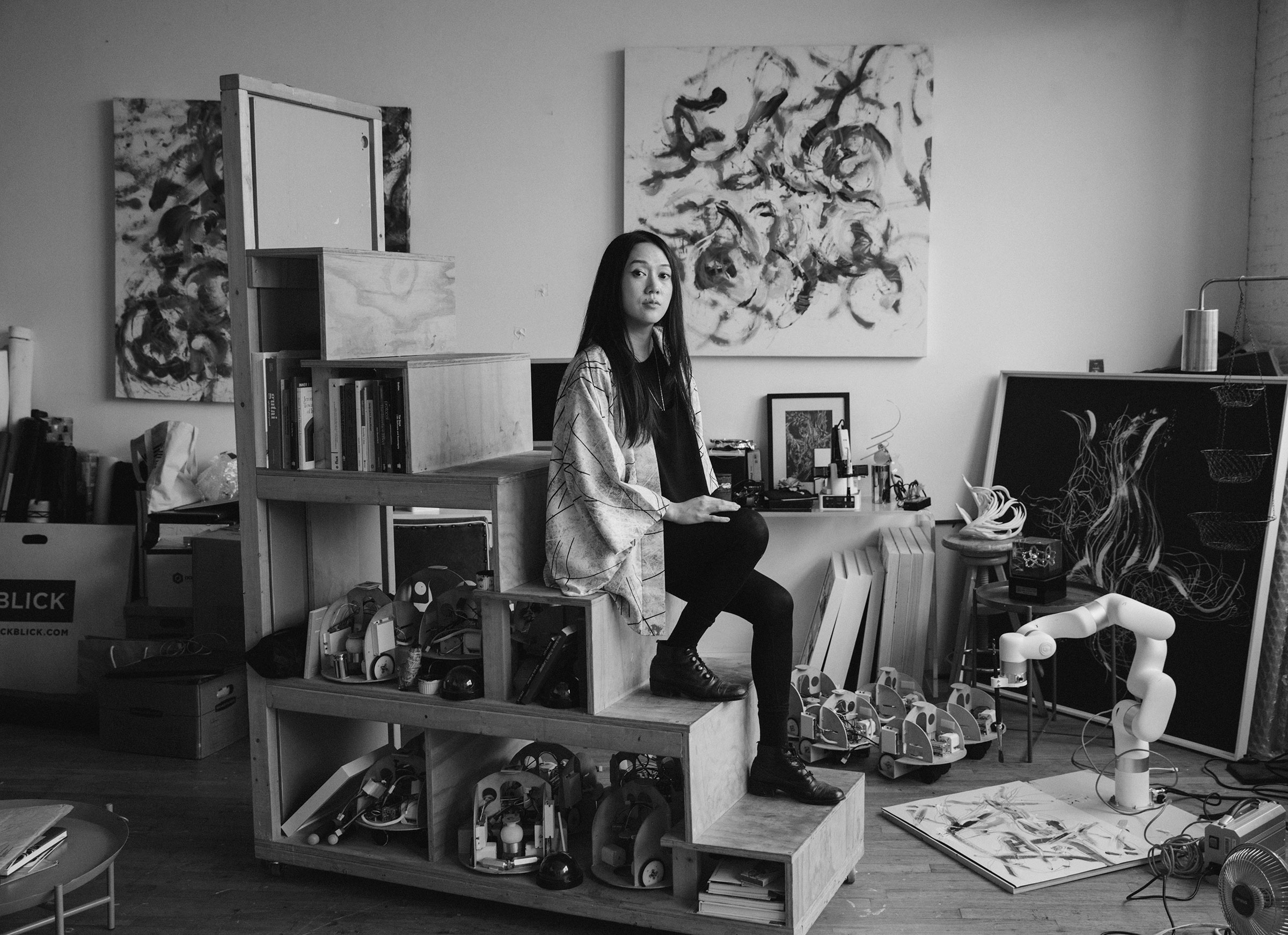
The AI art that Sougwen Chung makes is very different from the images spit out by popular image-generation tools like Midjourney or DALL-E. Chung, an artist who splits their time between London and New York and identifies as nonbinary, trains a neural net on their own work, then builds robots to physically paint in tandem with them on giant canvases. The robots not only mimic their brush strokes, but create new patterns and shapes that Chung then responds to. The result is hypnotic and eerie—and sets the tone for how artists might increasingly use AI as just another artistic instrument, like a violin or a paintbrush.
Chung, who has won several awards for their pioneering explorations of art and technology, caught up with TIME in London to talk about distrust of AI in creative circles, the forces shaping the technology, and the potential it has as an ally in the fight against climate change. Excerpts are below.
There is currently a widespread fear that AI is replacing people in creative fields. What do you tell artists who are worried about that, and about introducing machines into their artistic practices?
I believe that art enables you to hold fear and hope in the mind at the same time. I don't think it's about trying to ignore [fear]: It’s about trying to walk towards it, and finding your own inspirations and your own hope.
How important is centering humanity in the artistic process to you?
There's a really strong push in certain sectors right now to eliminate the human hand and just automate our creativity to death. In that way, centering humanity and human agency is incredibly important. The systems that generate a facsimile of a painting or photograph or whatnot are really just reflections of our own biases, and cultural and technological imaginations.
But outside of the genre of art and technology, I’m not as interested in centering the human subject. Part of what I do in the work is try to understand my own processes: to try to decenter myself through translations of my work to the machine.
You’ve been working with AI long before this current boom. What do you make of the rhetoric, energy and money flow of this hype cycle?
I think the energy of this current hype cycle comes from being in a really uncertain moment. With the climate crisis, with the pandemic, with all these geopolitical tensions happening in the world, I feel like they're connected to the hype cycle in that people are looking for a new hope through technology. And they put excitement into this abstraction of AI, because it seems like an opportunity for something new.
You've described collaboration with AI as something that fuels creative growth, offering a new lens on any given work. Do you think AI could offer novel perspectives when it comes to other disciplines as well—for example, helping to develop new climate solutions?
There are climate scientists and researchers who will have a more concrete answer. But from my experience with working with AI systems, I’ve become really aware of the limitations of the human sensory apparatus. We see in binocular vision; we have a limited range of frequency for hearing. I think the climate crisis in particular requires a really broad and interconnected sensory apparatus for creating solutions that aren’t possible by just one mode of sensing.
If AI is going to be increasingly central in our lives, what values should we approach developing this technology with?
We often think about replication and automation and convenience [when designing these systems]. But that doesn’t lead to more interesting questions. Nor does it create the conditions for the world we want to live in. So I think stewardship of what came before, whether that's art practice or the environment, is massively important as a value for designing these systems.
This article is published as a part of TIME’s TIME100 Impact Awards initiative, which recognizes leaders from across the world who are driving change in their communities and industries. The next TIME100 Impact Awards ceremony will be held on Feb. 11 in Dubai.
More Must-Reads From TIME
- The 100 Most Influential People of 2024
- Coco Gauff Is Playing for Herself Now
- Scenes From Pro-Palestinian Encampments Across U.S. Universities
- 6 Compliments That Land Every Time
- If You're Dating Right Now , You're Brave: Column
- The AI That Could Heal a Divided Internet
- Fallout Is a Brilliant Model for the Future of Video Game Adaptations
- Want Weekly Recs on What to Watch, Read, and More? Sign Up for Worth Your Time
Contact us at letters@time.com